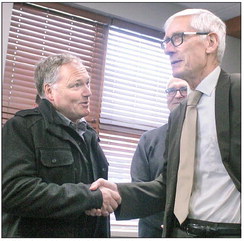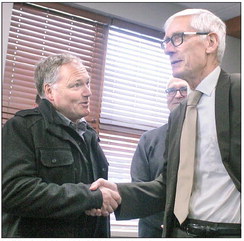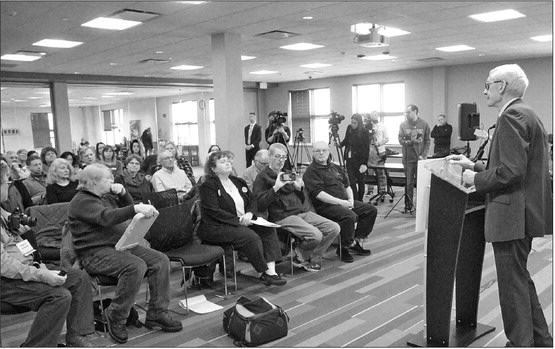Evers creates fair maps commission


He rules out gerrymandering
Gov. Tony Evers told a crowd gathered at the Marathon County Public Library, Wausau, on Monday that he used an executive order to create a nonpartisan People’s Maps Commission, making good on a campaign promise to end gerrymandered legislative districts.
The governor, however, said he couldn’t be sure the courts would, in the end, stick with the commission’s work. They might, instead, favor a redistricting alternative favored by the Republican controlled legislature or favor some third alternative .
Evers said the commission’s real work will start in March 2021 after the 2020 Census is complete.
Evers said state officials continue to sideline popular, centrist policies, including medical marijuana, background checks for guns and Medicaid expansion, because offi cials are given safe seats in gerrymandered districts.
“These issues have between 70 and 80 percent support in polls, but you can’t make any progress on them,” said the governor. “I don’t get it. There’s something wrong when elected officials can rely on the safety of their seats rather than the quality of their work.”
Evers said the People’s Maps Commission will “look like Wisconsin” and anyone can apply to be a member. The commission will have access to staff people from the Department of Administration.
He said no high priced consultants or lobbyists will be selected for the panel.
Evers said he wanted the People’s Maps Commission to draw up a truly nonpartisan map. The last thing he wanted, he said, is a redistricting map that would seek to enact “retribution” on Republicans for the current, extreme gerrymandering in the present map.
Many “fair map” supporters showed up to hear the governor’s announcement.
Hans Breitenmoser, a Lincoln County supervisor, said he and other county board members adopted a resolution in September 2017 in support of nonpartisan redistricting. Later, Lincoln County voters supported a “fair maps” referendum by 65 percent.
Breitenmoser said voters in 50 counties home have to date supported “fair maps” in recent referenda.
“This is 78 percent of Wisconsin voters who have said loud and clear they want to end gerrymandering,” he said.
Marshfield attorney Ann Stevning-Roe said federal judges have figured out Wisconsin legislative redistricting in the past, but that likely would not work going forward. She noted the U.S. Supreme Court ruled in Gil v. Whitford it lacked the power to decide questions of redistricting fairness.
To Stevning-Roe, this means state courts, possibly the Wisconsin Supreme Court, will ultimately figure out Wisconsin’s next legislative map.
She said a commission’s work would be better than a judge’s fix. The commission, she said, can use sophisticated computer algorithms to bake in fairness to maps. A judge will likely just tweak an old map to meet a new legal hurdle, she said.


